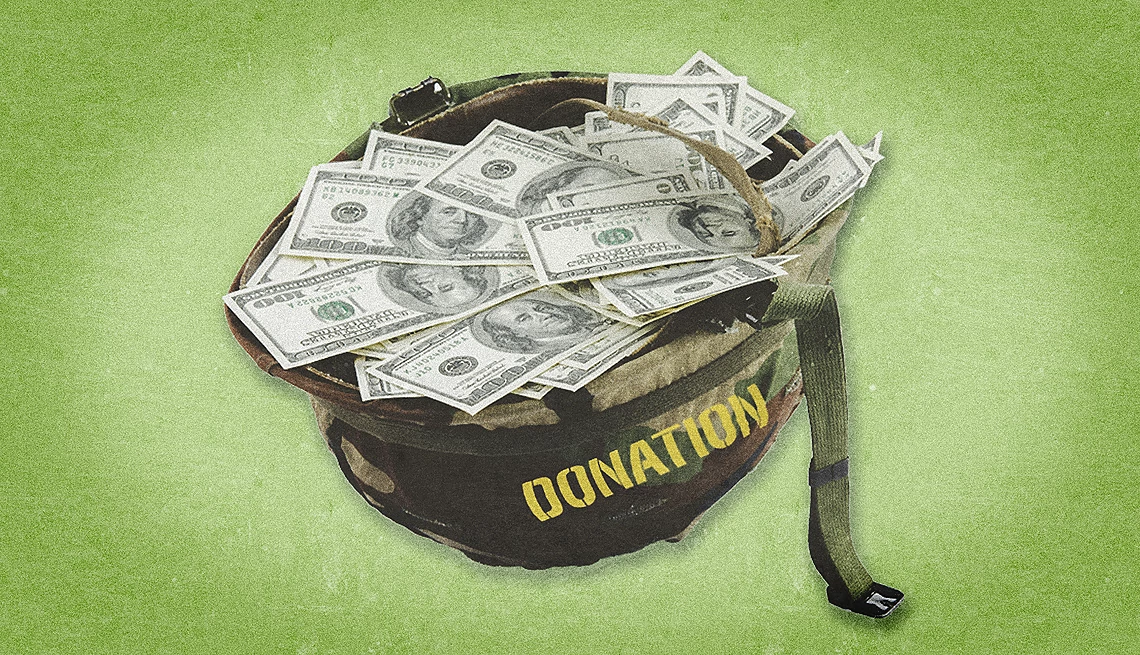AARP Hearing Center


In this story
Impact of scams • Common charity scams • Safe giving • Protect yourself • Reporting scams
As an Army veteran raising a daughter with cystic fibrosis, Lindsay Meisner cared deeply about veterans’ causes and sick children. When she met a man claiming to raise money for the Wounded Warriors Project and a children’s charity while golfing in Scottsdale, Arizona, Meisner gave him her savings to support his efforts. When she tried contacting him to see how his initiative was going, he had disappeared.
“You would hope an older guy in a polo sitting there talking about Wounded Warriors, that they would be a good person. Like … you just wouldn’t think that they would target such vulnerable topics, but maybe that’s [the] kicker. Because they know that it pulls on you,” Meisner says in an episode of AARP’s The Perfect Scam podcast, which details how police caught the scammer.


AARP Membership— $12 for your first year when you sign up for Automatic Renewal
Get instant access to members-only products and hundreds of discounts, a free second membership, and a subscription to AARP the Magazine.
“Donors need to be on higher alert when they’re solicited by veterans and military charities. [Scammers] pack a one-two punch, playing on both your empathy and your patriotism,” says Laurie Styron, CEO of CharityWatch, an independent monitoring organization.
Shady operators don’t just steal or misspend money. They divert millions of dollars that might otherwise flow to the many honorable organizations providing housing, job training, mental health care and other vital services to former military members and their families.
How veteran charity scams work
You may be approached in person, by mail, email, text or on the phone. Giving in the public society benefit category, which includes veterans, totaled $62.8 billion in 2023. Adjusted for inflation, that’s up more than 7 percent from the year before, according to Giving USA. Here are a few ways scammers try to get a piece of those funds.
Mimic genuine charities. Bogus military charities may reach out by direct mail, email, phone calls or texts, often imitating well-known charities. “Questionable operators are counting on the fact that you’re not going to look further to see if that’s the one you’re thinking of and you’re just going to give,” says Bennett Weiner, executive vice president and chief operating officer of the Better Business Bureau’s Wise Giving Alliance, which rates charities.
Prey on your kind nature. They tell heartrending stories and use evocative images to appeal to your patriotism and sympathy. If you hesitate, they imply that veterans sacrificed for the country, but you’re unwilling to help them. “What I recommend is (that people) understand that there’s a difference between being supportive of a cause and being supportive of a specific charity working in that cause,” Styron says.
Pretend you’ve given before. They claim you gave to them before and they’re just following up on a promised donation or asking you to renew your contribution. “They are trying to make it sound like you’ve already vetted them and you just forgot,” Weiner says.































































More From AARP
How to Keep a Loved One With Cognitive Decline Safe From Scams
Key steps to protect vulnerable family members’ finances in an age of rampant fraudAI Fuels New, Frighteningly Effective Scams
The technology can help criminals impersonate celebs, law enforcement — or even you
What to Do If You've Just Been Scammed
How one woman worked quickly — with help — to avoid being charged through PayPal
Recommended for You